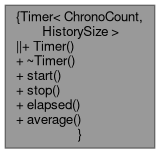Loading...
Searching...
No Matches
Timer< ChronoCount, HistorySize > Class Template Reference
#include <Timer.hpp>
Collaboration diagram for Timer< ChronoCount, HistorySize >:

Public Member Functions | |
| Timer () | |
| ~Timer ()=default | |
| void | start (const int index=0) |
| void | stop (const int index=0) |
| template<typename T = std::chrono::nanoseconds> | |
| double | elapsed (const int index=0) const |
| template<typename T = std::chrono::nanoseconds> | |
| double | average (const int index=0) const |
Constructor & Destructor Documentation
◆ Timer()
template<size_t ChronoCount = 1, size_t HistorySize = 1000>
|
inline |
◆ ~Timer()
template<size_t ChronoCount = 1, size_t HistorySize = 1000>
|
default |
Member Function Documentation
◆ average()
template<size_t ChronoCount = 1, size_t HistorySize = 1000>
template<typename T = std::chrono::nanoseconds>
|
inline |
◆ elapsed()
template<size_t ChronoCount = 1, size_t HistorySize = 1000>
template<typename T = std::chrono::nanoseconds>
|
inline |
◆ start()
template<size_t ChronoCount = 1, size_t HistorySize = 1000>
|
inline |
◆ stop()
template<size_t ChronoCount = 1, size_t HistorySize = 1000>
|
inline |
The documentation for this class was generated from the following file:
- src/utils/Timer.hpp